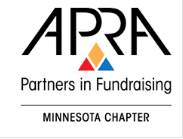


APRA-IL member Carolyn Hersch shared a piece she wrote for C.A.L.L.’s (Chicago Association of Law Librarians) newsletter regarding her work with APRA-IL and bridging gaps between development professionals and librarians. APRA-IL President Katie Ingrao also provides her thoughts on APRA-IL’s first webinar and the positive impact of partnering with Carolyn and outside organizations like C.A.L.L.
Carolyn:
Last fall, I attended a daylong conference hosted by APRA-IL, which focused on hot topics in prospect research. APRA-IL is an organization for prospect development professionals in the Chicagoland area. Prospect research involves researching, managing, and analyzing data with the goal of gaining donors for non-profit organizations. Librarians are getting hired in this field, as the skill set matches neatly with the profession. The majority of prospect development positions can be found with universities and hospitals, although the field is growing.
According to APRA, Prospect Development has evolved to include the following roles and responsibilities:
· Prospect identification and research: discovering and evaluating prospective donors, and their interests, relationships, inclination to give and philanthropic capacity to inform and support an organization’s fundraising strategies and outreach efforts
· Relationship management: managing, tracking, and reporting on an organization’s activity with its constituent and prospect pools, and making recommendations to positively influence fundraiser and campaign activity
· Data analytics: supporting an information-driven decision culture by deriving conclusions and identifying trends through the statistical analysis of internal and external data
The skills that our prospect research counterparts have are important for librarians to be aware of, regardless of the work setting. Future attorneys and law firms need to know how to research whether prospective or existing clients have the means to pay them. Law schools have fundraising arms. Law firms like to understand what strategic advantages they can get.
One of the connections I made was with APRA-IL President, Katie Ingrao. Katie is the Assistant Director of Prospect Management at Rush University Medical Center. From our meeting came CALL’s first collaborative webinar. On February 17th, CALL, APRA-IL, and APRA-MN presented a webinar comparing and contrasting competitive intelligence with prospect research. Over 50 participants from the three organizations listened in. Jerry Burch, from Latham Watkins and Darren Cooper from the Mayo Clinic discussed competitive intelligence and its non-profit sibling, prospect research. Jerry and Darren each presented on their respective fields and then held a panel discussion comparing the type of research they do, ethical questions, skills, tools, intricacies of both professions, and the divide of nonprofit vs. for profit organizations.
Katie:
APRA-IL hosted its first webinar on February 17th and we partnered with APRA-MN and C.A.L.L. (Chicago Association of Law Librarians). Our topic focused on the fields of prospect research and competitive intelligence. My goal with this webinar was to explore professional fields beyond development that are relatable to prospect researchers and can be sources of inspiration, motivation, and collaboration for us. This was a goal easily met since competitive intelligence professionals are so relatable in their methods, techniques, and general purpose within their organization. Besides starting to build a network beyond development, I took away two important lessons from the process of putting this webinar together.
I found this webinar to be extremely helpful to prospect development professionals in making connections to positions in the corporate world. It’s always smart to be aware of what you are qualified to do and who values your skills beyond your current situation. The competitive intelligence field is our corporate sibling and has great potential for prospect researchers looking to break out of the nonprofit bubble.
The second lesson that I took away from the webinar and entire experience of collaborating with outside professionals was there are big rewards when I think outside of my little prospect development box. Talking to a professional from a related field can be great for your critical thinking skills. Competitive intelligence professionals approach their job from a corporate mentality but share technics and a common purpose with prospect researchers. Their ultimate goal is to gather, analyze, and advise on data for their organization’s leadership. Listening to CIs talk shop helped me think about how I approach my work and can use different tools or technics to improve my results.
I thoroughly enjoyed collaborating with APRA_MN and C.A.L.L. on this webinar and look forward to more like it! Be sure to register for our next webinar by Namrata Padhi on Researching Start Up Companies on April 26th at 12 p.m. https://attendee.gotowebinar.com/register/5553718267221333249
